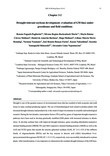Drought-tolerant soybean development: evaluation of GM lines under greenhouse and field conditions
JIRCAS Working Report
| ISSN | 1341710X |
|---|---|
| NII recode ID (NCID) | AA11159468 |

Full text
Drought is one of the greatest sources of environmental stress that has resulted in both economic and yield losses in many soybean-producing regions. The use of biotechnological tools aimed to produce plants with increased drought tolerance and productivity is the result of major investments in scientific and technological research. During the last decades, transcription factors (TFs) and key genes of important drought-responsive pathways have been used to develop genetically modified (GM) plants with increased tolerance to abiotic stress. To develop soybean lines with improved drought tolerance, genes encoding dehydration-responsive element binding protein (DREB) TFs and ABA-responsive element-binding proteins (AREB) as well as the GolS and NCED genes that encode the enzyme galactinol synthase (GolS, EC 2.4.1.123) of the raffinose family of oligosaccharides (RFOs) and the key enzyme in abscisic acid (ABA) biosynthesis 9-cisepoxycarotenoid dioxygenase (NCED, EC 1.13.11.51), respectively, were successfully introduced in soybean plants. After transformation, it was imperative to characterize the resultant drought tolerance of the GM lines. Thus, the soybean GM lines containing genetic constructions to overexpress AtDREB1A, GmDREB1A, AtDREB2A, AtAREB1, AtGolS2, and AtNCED3 were phenotyped based on molecular and agronomical traits, growth parameters, and survival rates under water deficit conditions in experiments carried out under greenhouse and field conditions for more than one crop season. All obtained results were compiled and are presented in this report. Overall, the GM lines are promising and show improved drought tolerance as diverse defense mechanisms aimed at surviving periods of water scarcity were targeted while retaining the productivity of the crop. These outcomes highlight soybean drought-tolerance pathways and indicate that the use of biotechnological tools in agricultural research can help producers minimize both yield and financial losses during drought-stricken crop seasons.
| Date of issued | |
|---|---|
| Creator | Renata Fuganti-Pagliarini Silvana Regina Rockenbach Marin Mayla Daiane Côrrea Molinari Daniel de Amorim Barbosa Hugo Molinari Liliane Márcia Mertz-Henning Norman Neumaier José Renato Bouças Farias Kazuo Nakashima Kazuko Yamaguchi-Shinozaki Alexandre Lima Nepomuceno |
| Subject | Glycine max transcription factor DREB AREB ABA galactinol synthase 9-cisepoxycarotenoid dioxygenase water deficit yield |
| Publisher | Japan International Research Center for Agricultural Sciences |
| Type | Technical Report |
| NII resource type vocabulary | Technical Report |
| Volume | 91 |
| spage | 57 |
| epage | 88 |
| Language | eng |
